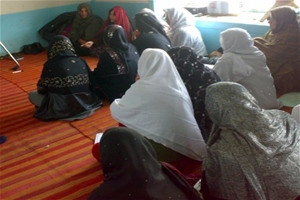
Peace building training in Ghazni Province.
IRD
660 women participate in the institutional capacity and community-based peace building program in Ghazni Province as part of USAID’s Strategic Provincial Roads program.
23 SEPTEMBER 2010 | GHAZNI PROVINCE, AFGHANISTAN
Non-violent conflict resolution in local communities is essential for bringing peace and stability to Afghanistan. In the recent history of this war-torn country, the most effective agents for advancing peace and security have been indigenous structures such as Shuras, Jirgas, and Maliks. Maliks are key local power brokers who serve as arbiters in family and community conflict.
In this predominantly rural and traditional society, men usually take on the role of leader and mediator. However, despite this cultural norm, Afghan women throughout history have also played remarkable roles brokering peaceful outcomes to disputes between families, tribes, and local communities.
To enhance women’s role in the stabilization effort, USAID and the Government of the Islamic Republic of Afghanistan have provided support through a grants program within USAID’s Provincial Strategic Roads program. This supports the development principle that road construction needs to go hand in hand with community development along road alignments.
A grant for institutional capacity and community-based peace building was created for the Malistan and Jaghori districts in Ghazni Province. This grant enables women to realize their potential as peace builders in their communities.
Nafisa, the head of the Tabarghanak Female Peace Shura, brokered peace deals such as pathway access between local neighbors. Prior to Nafisa’s peaceful mediation, the conflict was so tense, that for years, the wives and children of these neighboring families were not allowed to speak to one another.
Despite doubts and discouragement from the community’s men, Nafisa and the Shura eventually bought an end to the conflict. “They did not want us to intervene. They told us that women could not end conflicts, only men could,” said Nafisa. “After the conflict ended, their attitude changed. They saw women as having the skill and power to solve social problems.”
Nafisa’s conflict resolution skills enabled her to mediate a long standing neighbor feud. As a result, Nawroz, one of the feuding neighbors said, “We are sorry for ignoring you at first. You proved that women can resolve conflicts. You are better than men in most cases.”







Comment
Make a general inquiry or suggest an improvement.